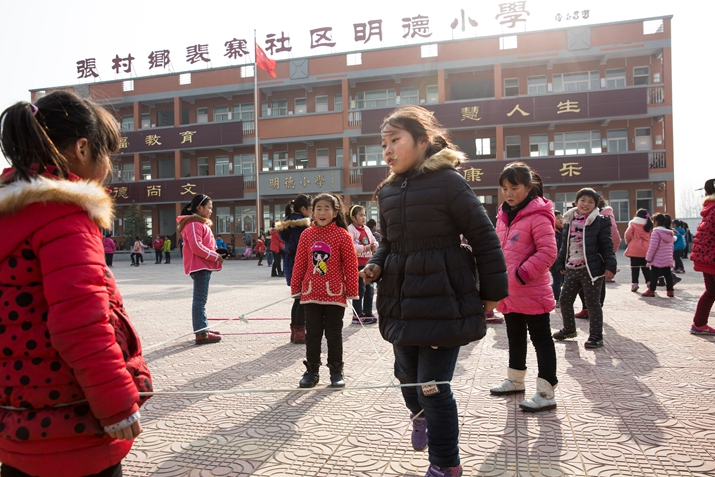The Man Who Changed a Village
|
|

Students in the playground of the newly revamped school in Peizhai Community (QIN BIN)
Repaying the village
In 2005, the villagers of Peizhai, led by their former leader, came to see Pei Chunliang, urging him to return to the village and be its new chief. Mindful of the favors he owed them, he agreed.
On returning to the mountain village as its new leader, Pei Chunliang put it onto a fast growth track. He invested nearly 90 million yuan ($12.98 million) out of his own pocket to build villas, farmland ponds and a reservoir, improving villagers' lives and addressing the acute drinking water shortage the village had suffered for generations.
In 2010, under a government plan, residents of other impoverished villages with drinking water scarcity were relocated to Peizhai.
Guided by Pei Chunliang, villagers built greenhouses, grew organic vegetables, and engaged in other forms of high-efficiency agriculture. A commercial street was developed, providing a vending platform for business owners. This spurred the development of the service industry.
In 2016, Pei Chunliang invested 80 million yuan ($11.6 million) in residential buildings to accommodate people who were being relocated to Peizhai from two villages 60 km away.
Today, Peizhai has shaken off poverty. Local residents' per-capita annual income increased from just 1,000 yuan ($144) in 2005 to $11,000 yuan ($1,588) in 2015. Peizhai has been enriched by cultural, sport and entertainment facilities so that villagers can enjoy urban amenities. Its official name has been changed to Peizhai Community.
Going beyond food
With the villagers' basic needs met, Pei Chunliang is focusing on medical care and education for them.
When several young and middle-aged villagers died of high blood pressure in quick succession in the past, Pei Chunliang realized it was because the villagers did not have basic medical knowledge. "They died young due to a problem that could have been solved by a simple dose of medicine," he lamented.
To prevent such tragedies from recurring, he has put up community bulletin boards that inform people about common diseases such as high blood pressure and diabetes. Besides, every year, the village invites doctors from a hospital in Huixian County, which Peizhai is subordinate to, for free medical check-ups and advice. Sport equipment has been installed in the village so that people can exercise to stay fit.
In addition to improving people's health, Pei Chunliang wants to give the village children a better education. The village has built a new primary school, and during every summer and winter vacation, college students from the cities are invited to come and teach Peizhai's children singing and dancing as well as tell them about the outside world. Pei Chunliang also sponsors impoverished students' university tuition fees.
However, despite these achievements, he feels rural areas still lack adequate educational and medical resources and he wishes the government would give rural areas more support in these aspects. Pei Chunliang is waiting to address these issues at the annual National People's Congress (NPC) session in early 2017. As a NPC deputy, he would like to put forward a proposal on rural health service and education. Also, in the future, he hopes to popularize the use of the Internet and e-commerce in rural areas.
"We are developing rural tourism and sightseeing agriculture. We are going to build Peizhai into a prosperous, modernized community, where people can lead more happy lives," Pei Chunliang said.
Copyedited by Sudeshna Sarkar
